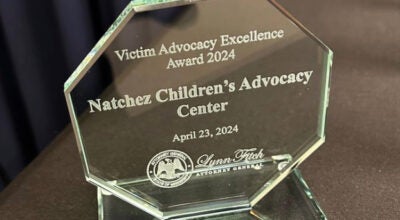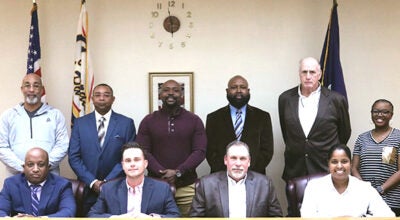New policy addresses parent visitation issue
Published 12:12 am Friday, October 9, 2015
NATCHEZ — The Natchez-Adams School District’s board of trustees started Thursday the process of changing a policy that will allow greater leeway for parents to visit their children at schools.
Assistant Superintendent Tanisha Smith said the current policy — adopted as a part of a packet of recommendations — was worded in such a way that parents could not visit the school during instructional time.
A parent had gone to visit a school, and a principal had denied them the right to visit based on the policy, she said.
The new policy addresses the issue while still protecting the educational operations of the school, she said.
“The principals have actually gotten together and crafted the (recommended changes),” Smith said. “It was totally from the administrators, what they feel will be the least interruption during the instructional day.”
The proposed change was already on the agenda, but concerned grandparent Cece Harper also addressed the board about the issue.
“We should have the right to be involved in our children’s education,” she said.
The board members later said they were glad Harper addressed them with her concerns, and trustee Thelma Newsome said the board members hoped parents understood it was not the intention of the board to deny them the right to visit schools.
The policy was adopted on the recommendation of the state school board association, she said, and slipped past the board members’ attention, Newsome said.
“On behalf of the board, I ask (parents) to forgive us,” she said. “We wanted to deny no parent the right to visit the school — we want parental involvement.”
In other news:
-The board discussed televising its meetings.
The trustees had previously instructed Superintendent Frederick Hill to find out the cost for having Bruce TV record its meetings.
The cost would come to $100 an hour with a required additional two hours for editing and titling, Hill said.
Trustee Cynthia Smith said she didn’t know if the board’s meetings were interesting enough to record.
“If (people) wanted to come, they would come,” she said. “If they were interested, it would be worth it.”
But trustee Benny Wright said he thought the recordings could act as a “fail safe” for the board to get its message out. People would only have to turn on public access television, he said.
“We could disseminate this information to the community with a minimum of effort,” Hill said. “Some of the things that we do, when it gets to the community, it has a different spin. The citizen will have access to what happened himself rather than what is filtered through the other (public) boards and then disseminated into the community that way.”
President Tim Blalock said he though the recordings would be good to have, but all things considered, “it costs a little.”
“We could set up our own camera and air it,” he said.
Newsome pointed out that the Fallin Career and Technology Center has a digital media program.
“I think if we wanted to have a tape that aired, we could let the children have the experience,” she said. “Have the digital class at Fallin come in and tape a few meetings and see what they can do.”
The board members told Hill to give them an update in November about possibilities if he didn’t have a recommendation at that time.
-The board adopted a memorandum of understanding with Pediatric Adolescent Clinic that would allow PAC to set up a screening center at Robert Lewis Magnet School.
As part of the agreement, PAC will provide a nurse practitioner for the site.
Julie Timm with PAC said the clinic will serve as a public health outreach to catch issues that interfere with the educational process.
Timm said the clinic’s ultimate creation would still be contingent on Medicaid approving the school as a secondary site. Medicaid would fund the screenings, she said.
The board adopted the memorandum 4-1, with Wright voting against it.
Wright said he believed past presentations about the clinic have misrepresented things to the board.
“Please do not let our children be used to collect Medicaid fees,” he said. “We need to be vigilant on all efforts.”
Newsome said when the district has done screening clinics before they have been very effective.
“There were instances where children were discovered to have lead poisoning or scoliosis, and because they did not see a doctor on a regular basis, these things had gone unnoticed,” she said. “We were able to use the clinics to make referrals to doctors and address the issues.”





